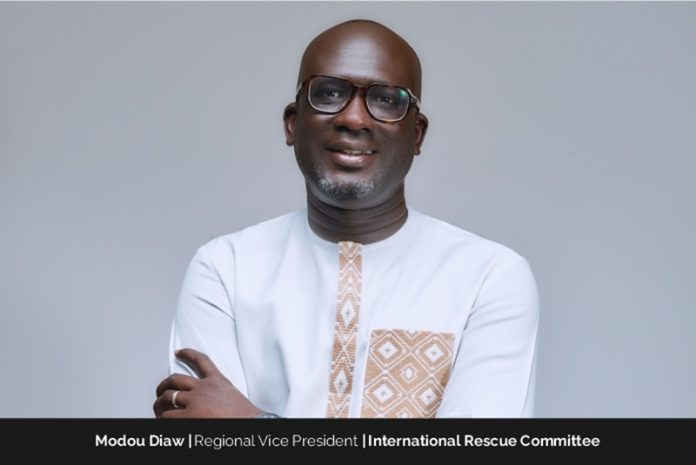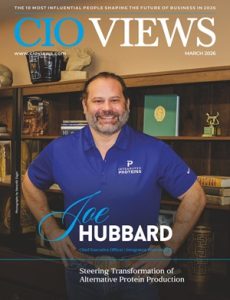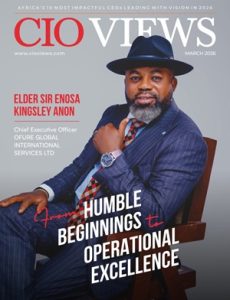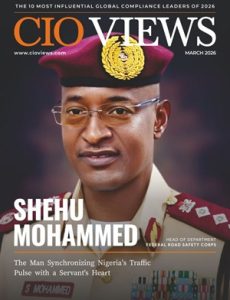As Regional Vice President for West Africa at the International Rescue Committee (IRC), Modou Diaw leads teams across one of the world’s most complex humanitarian sectors. His leadership style blends field-tested wisdom with a deeply personal mission. But the promise is etched long before any designation. He says it starts with a memory, faint but formative. In 1989, a political rupture between Senegal and Mauritania forced his family to flee across the border. He is a child, then, too young to grasp the politics, but old enough to feel the rupture. They arrive in Senegal with nothing, carried by strangers and sustained by aid. That experience, he shares, never leaves him.
Modou grows up in a hard-edged suburb of Dakar, where hardship is the norm and meals are often scarce. His mother, despite the scarcity, shares what little they have with neighbors in need. From her, he learns that generosity is about principle, not about abundance. That early imprint stayed with him. When he entered the humanitarian field, he did not view it as a career progression. He saw it as a return. “Humanitarian work, for me, is not just a job,” he notes, “it’s a calling rooted in dignity, empathy, and shared humanity.”
For him, it’s a personal obligation to stand beside others in their most uncertain moments, making them feel seen, heard, and helped with respect. He speaks of West Africa with clarity and affection, a region shaped by cascading challenges, yet sustained by uncommon resilience. What keeps him moored is not just the scale of the work, but the spirit he witnesses on the ground. That gentle strength reminds him why presence, empathy, and dignity must define every response.
Over the course of more than a decade with the IRC, Modou has served in some of the world’s most demanding environments, including roles as Field Coordinator in rural Chad and Country Director in countries such as Haiti, Central Africa Republic, Burundi, Niger, Mali, DRC Congo and Côte d’Ivoire. He notes that each experience deepened his understanding of leadership through proximity, patience, and partnership, profoundly molding his professional philosophy. These experiences taught him that true leadership is as much about listening as it is about leading.
As we interact with Modou Diaw for our exclusive cover feature, he takes us through his incredible journey, sharing real-life learnings, experiences, and turning points that have shaped him into the person he is today. This feature offers not just an overview of his work, but a blueprint for leading with integrity in the most complex environments.
Leading Through the Layered Storm
In West Africa, crises are often compounded by conflict, climate shocks, displacement, and weak infrastructure, all of which intersect to deepen instability. The region carries layered vulnerabilities. The Sahel, in particular, faces the double blow of intensifying violence and climate collapse. In Nigeria’s northeast, years of protracted conflict have broken public trust and decimated basic services. In Mali and Burkina Faso, shrinking civic space makes humanitarian access increasingly fragile. Modou believes the harshest challenge is often invisibility, when entire communities suffer without global visibility. That silence, he stresses, must be broken with action, advocacy, and a commitment to equity.
Modou sees leadership here not as a sprint toward the immediate, but as a steady hand building for what must hold. It will test every part of your mind, body, and spirit. To stay steady, he returns to his purpose. Each day, he reflects on ‘why I do this work and for whom?’ That clarity makes pressure manageable. Modou speaks often of pace with purpose. Speed matters, yes, but not at the cost of coherence. He feels that quick fixes can fracture more than they heal. Each response should be beamed with tomorrow in mind. He often says, “Deliver today, but design for tomorrow.” He stays in constant dialogue with frontline teams, translating their lived realities into strategic choices that shape regional response.
At the IRC, the veteran leans on his tight-knit, tenacious team, drawing strength from their dedication and camaraderie. Together, they invest in what can be called “readiness beyond reaction,” utilizing tools such as anticipatory action and scenario-building to sharpen resilience before a rupture occurs. The IRC doesn’t wait for a crisis to escalate before it moves. It employs early warning systems and cash transfers to prepare for the shock in advance. Scenario planning, early warning systems, and anticipatory cash transfers allow teams to prepare ahead of the shock. “Emergencies demand speed, but resilience requires vision,” Modou adds. His approach blends foresight with flexibility; what matters is not just reacting fast, but ensuring communities can recover stronger.
For him, real crisis leadership is more craft than command. It’s measured. Reserved. Enduring. It rebuilds trust where it has frayed, restores dignity where it has been stripped, and fortifies local systems without overwhelming them. He reminds his colleagues that the most meaningful humanitarian work is often invisible by design. “In every crisis, we must think beyond relief, toward systems that restore resilience, dignity, and long-term recovery.” For Modou, solidity isn’t just surviving the storm, but knowing how to stand taller when it passes.
Even in the midst of it all, he makes space for family, for prayer, and pause. For Modou, resilience is not about being unbreakable; it’s about being rooted. He views balance not as luxury, but necessity.
What Holds a Leader Together
Modou builds his leadership on three qualities he says never let him down: hard work, integrity, and humility. They were instilled early, shaped by the ways of his upbringing, his faith, and the harsh lessons learned in the field.
To Modou, hard work is not about overextension. It’s about consistency. Being ready. Staying the course even when the conditions change. Integrity means doing the right thing when there’s no one to impress, no audience to applaud. And humility? That’s the grounding force. The reason he tells his team, “Don’t call me RVP. Just call me Modou.”
He views humanitarian leadership as a craft that hinges on two key levers: people and performance. Leave one behind, and the structure falters. Delivering outcomes is essential, but only if it doesn’t come at the expense of morale. He believes a leader’s duty of care is just as critical as their targets. And how they behave under stress often sets the tone more than any result ever could.
Trust, too, sits at the core of his approach. Not the soft kind, but the kind earned through presence, follow-through, and fairness. Still, he makes it clear that trust isn’t a free pass. “It doesn’t replace accountability,” he often says. To him, the most highly performing teams are those where trust and responsibility walk hand in hand. His mantra: ‘Empower without abdicating responsibility.’
When Hope Feels Tangible
One of the moments that stays with Modou unfolds in Northern Nigeria, a region scarred by years of conflict and chronic hunger. He recalls arriving in a community where food insecurity is rampant and malnutrition among children has reached dangerous levels.
His team at the IRC introduced a model that integrated nutrition, WASH, and economic recovery, all of which were structured by strong community involvement. Within months, malnutrition rates dropped sharply, and something else returned. It was a sense of belief.
He says the numbers mattered, but what stayed with him was a mother who approached him in tears and said, “For the first time, I believe my children have a future.” He describes that moment as a reminder of why humanitarian work must go beyond relief. Its purpose is to rebuild hope in a meaningful way. For Modou, outcomes matter, but transformation is measured in dignity restored.
Collaboration Without Borders
In West Africa, leadership is more about interpretation than instruction. Modou works across a mosaic of languages, governments, and lived realities, where influence depends not on label but on trust earned over time. He says the work begins with presence. He listens first, asks often, and builds rapport that runs deeper than formal agreements. With ministers, community elders, and frontline staff alike, he prioritizes mutual respect over hierarchy.
What sets the IRC’s regional model apart is its focus on co-creation. Success in one country is never isolated. A breakthrough in Niger might reshape strategy in Burkina-Faso. Teams stay connected across borders, exchanging ideas that adapt, evolve, and respond to the changing domain. For Modou, real collaboration is not coordination. It is shared authorship. It is about knowing when to speak and when to step back. Although no one has the whole picture, together they make progress toward a lasting impact.
Local First, Always
This industry veteran considers localization a principle of fairness. He feels communities already carry the knowledge, the urgency, and the vision. The role of humanitarian leaders is not to override that wisdom, but to work alongside it. “Localization is not just good practice; it is a matter of justice. The people closest to the crisis are the ones best equipped to lead the response,” he says.
At the IRC, this ethos is embedded in every program. Local NGOs co-design solutions. Government systems are reinforced, not sidelined. Women, youth, elders, and civil society groups all have a seat at the table from day one. Modou emphasizes that real change emerges from within. His teams arrive ready to ask, observe, adapt, and build in step with communities. He stresses that the most effective leadership in crisis zones is rooted in collaboration and humility. When people shape their recovery, solutions resonate because they’re not only effective but also owned by them.
His Greatest Achievement? Making Others Stronger
Versatile in mind, precise in execution, and unwavering in conviction; Modou doesn’t just talk transformation, he turns it into action. Call it what you will, shift, spark, or force; his presence moves things forward. No wonder he’s been named among “Africa’s 10 Visionary Business Leaders Shaping the Future.” It reads like proof.
When asked which achievement stands out most in his career, Modou doesn’t rattle off awards or titles. Instead, he points to something harder to measure but impossible to ignore: the shift he’s helped lead across West Africa. From disjointed efforts to regional solidarity. From donor-led agendas to community-driven momentum. From short-term fixes to long-haul resilience.
He’s proud of the coalitions they’ve built, the young leaders they’ve backed, the women they’ve elevated, and the institutions they’ve fortified. As he puts it, “Leadership is not about what you accomplish alone; it’s about what you enable others to achieve.” And that’s precisely what makes his impact stick; it multiplies.
Innovation That Meets Reality
In the business world, innovation is often associated with sleek tools or flashy pilots. But for Modou, it is something different. He regards innovation as relevant. He states today’s crises demand responses that are faster, sharper, and rooted in the places they serve.
At IRC, this means providing cash transfers before floods, establishing mobile clinics in inaccessible areas, and promoting drought-resilient crops for local farmers. But the real breakthroughs come from the ground up, from people who live the urgency and shape the answers. He remarks, “Innovation must be inclusive, practical, and ethical.” If it doesn’t shift power, strengthen systems, or survive after the headlines fade, it simply doesn’t count. It must serve, not just shine.
For Those Who Want to Lead
Modou’s advice to rising leaders is simple, but lived. He suggests that they cultivate empathy first, allowing it to guide their observations, actions, and decisions. He urges them to embrace curiosity, seeing every person and every setting as an opportunity for learning. And when injustice surfaces, they must have the courage to speak, especially when it costs them something.
He reminds young professionals that this work isn’t a race for recognition. It’s a calling built on presence, patience, and a sense of purpose. The most profound impact, he says, often comes from those who move without praise, act without applause, and never lose sight of who they’re here for. “Let your presence be louder than your title,” he often says.
The Legacy He Wants to Leave
He hopes to leave behind a region that is stronger, fairer, and more connected than when he began. His vision for his legacy is to speak of service, not status, and to be remembered as someone who walked beside communities, not above them. Modou wants to be seen as someone who saw promise where others saw pain, and made life better, even in small, lasting ways. This is because, as he often emphasizes, “Leadership is not about position or title; it’s about presence, service, and the trust you build with people every single day.” If the systems he helps shape continue to stand grounded in dignity, equity, and inclusion, then he’ll know the mission was worth it. Titles fade, he says. What stays is the imprint one leaves behind. For Modou, legacy is not about being remembered, it’s about what remains useful when you’re gone.





